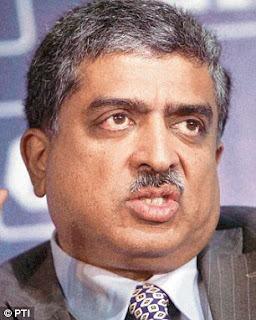By AMAN SHARMA
Last updated at 10:40 PM on 21st January 2012
It will be the Unique Identification Authority of India's (UIDAI) 'speed' versus the National Population Register's (NPR) 'fool-proof security'.
All eyes will be on home minister P. Chidambaram and Planning Commission deputy chairman Montek Singh Ahluwalia as they take their turf war before the Union Cabinet next week.
Before this crucial Cabinet meeting, expected on Wednesday, the home minister on Saturday visited Tamil Nadu and the Andaman & Nicobar Islands to distribute the first tranche of resident identity cards to the citizens living in the coastal areas.
The home ministry has prepared five lakh resident identity cards after collecting biometrics of one crore people in coastal villages of nine states and four Union territories as part of the initial phase of NPR.
The NPR project will now be rolled out at the national level at a cost of `6,649 crore. Under the project, all residents of India above 18 years of age will get resident identity cards after the Registrar General of India (RGI) collects their biometric data.
The home ministry is engaged in a turf war with UIDAI headed by Nandan Nilekani, which has the backing of Montek, over the collection of biometrics. The options before the Cabinet are either to allow both the UID and RGI to collect biometric data or mandate only the UIDAI to collect biometric data and share it later with the RGI to generate resident identity cards.
The 'turf war' heated up with home secretary R.K. Singh's letter to cabinet secretary Ajit Seth on January 16.
'The home minister has desired that the matter may be taken to the Cabinet at the earliest for a clear cut direction on whether the resident identity card, which is being implemented in the coastal areas, should be rolled out on a national level. A clear decision is needed as to which organisation will carry out the biometric collection in the field,' Singh wrote.
To counter the home ministry, the Planning Commission will move a note before the Cabinet, stressing on the 'speed' of the UIDIA to justify it being allowed to collect biometrics from all residents of India above five years of age.




